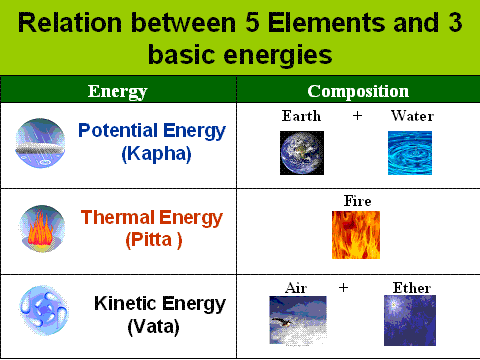The five elements are present in various living and non-living things in various ratios and proportions. Living things have five elements and a soul whereas non-living have only 5 elements in their composition. These 5 elements represent themselves in the form of 3 energies in humans called ‘Dosha’ or Tri-Dosha. These dosha can also be called Tri-Energies.

The balance of these tri-energies is known as state of health and their imbalance is disease. Anything which restores this balance is good for health. So any diet, exercise, behavior or medicine can be recommended to restore this balance and provide health. The tri-energies are Vata, Pitta and Kapha.
Vata or Air Element
It is the one of the most premier dosha that is responsible for major physiological actions in the body. It is not an organ that can be seen in the body but it is a presumed physiological character in the body that is responsible for the movements of other dosha i.e pitta and Kapha
Vata or Vayu is compared with Kinetic energy within the body. All the movements in the universe and inside the body are considered to be because of “Vata”. All the planetary movements, revolving of electrons around the nucleus, anything which moves has Vata component in it.
There are 5 types of Vata in our body:-
- Prana (Vata controlling respiratory function)
- Udana (Vata controlling speech function)
- Samana (Vata aiding digestive process, intestinal movements)
- Vyana (Vata responsible for body movements, movement of blood)
- Apana (Vata controlling evacuation of stool, urine)
Location of Vata in our body
According to Ayurveda, the location of Vata in our body is — large intestine (Colon, rectum), urinary bladder, urinary tract, spine, thighs and legs.
Functions of Vata in our body
It governs the physical movement of the body, circulates the body fluids, controls respiration, stimulates excretion of digestive juices, regulates peristaltic movements of intestines. In other words, it can be said that it controls neuro-hormonal system. The neurotransmitters, hormones can be considered as moving from one organ to the other because of Vata.
Emotions controlled by Vata
Fear, stress, anxiety, impatience are all aggravated and generally elevated in Vata type personalities and in case of increased Vata.
Physical attributes of Vata
Vata is rough, dry, light, mobile, cool and subtle.
Vata type personalities
Ayurveda has explained physical and mental characteristics of people having high Vata constitution.
Remedies for Vata disorders
Massage with hot Oils, Internal consumption of Ghee, Regular Sleep, Herbs like Ashwagandha, Ginger, Cumin, Turmeric, Guggul, Garlic, Asa foetida, Hot fomentation, Prayers and Meditation regulates Vata
